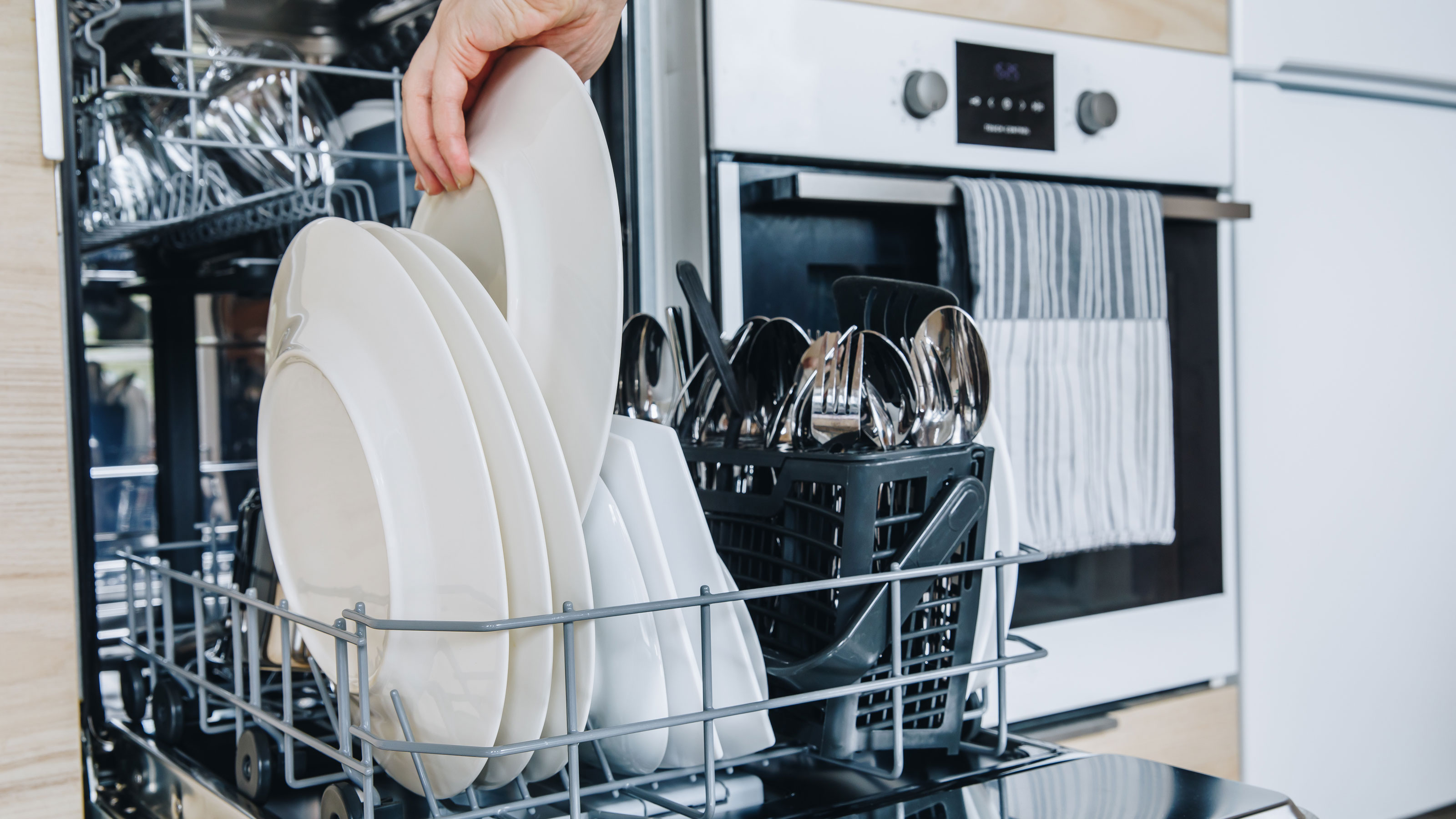Dishwasher not drying? Here are 8 possible reasons why and how to fix it
Plates and saucepans clean but still wet? Here’s what to do when the dishwasher’s not drying.


Has your dishwasher begun to do just half of its job? Yes, it’s still cleaning the load you put in there, but everything is still really wet. If that’s the case, you’ll be left asking why is my dishwasher not drying.
Normally, tidying away a clean load is just a question of putting it all back in the right place, but when you’re left having to dry everything before it can be put away, it’s a far more onerous task – and it shouldn’t be happening. Especially if you've invested in one of the best dishwashers around.
So, what could be going wrong, and what can you do to fix it? These are the possible causes when a dishwasher isn’t drying, and what you can do about them with advice from the experts.
Fix a dishwasher that’s not drying
There are a few different reasons why a dishwasher is not drying properly. Some are super simple to fix and won’t cost you anything at all, while others will mean a repair – and an accompanying bill.
1. Plastic and Teflon don’t dry like other materials
Is it the whole load that’s not drying properly or just those items made from plastic or Teflon? If that’s the case, the dishwasher hasn’t gone wrong, it’s just an issue caused by these materials.
To understand what’s going on, you need to know that many modern dishwashers use condensation to dry dishes. After the final rinse, which uses hot water, the items in the machine retain heat. The stainless steel walls of the dishwasher don’t retain as much and so the moisture that evaporates from the wash load condenses on the dishwasher’s walls. Plastic, though, doesn’t retain as much heat as other materials so it can stay wet when the rest of the load is dry.
With Teflon, characteristics of the material mean the water evaporates less well, leaving it wetter.
Get small space home decor ideas, celeb inspiration, DIY tips and more, straight to your inbox!
If either of these are the problem, there isn’t a fix although it’s worth noting that it’s generally recommended that Teflon kitchenware be washed by hand.
2. The dishwasher is poorly loaded
It’s worth going back to basics on your loading technique if your dishwasher’s not drying. Are you putting too much in? Are dishes tilted correctly? Perhaps they are touching one another or the parts of the dishwasher that move? Are items falling over and filling up with water?
Check the manual for your dishwasher model if you’re not sure about the correct way to load it (you can find it online if you’ve lost the one that came with the machine), and always gently spin the spray arm before starting a cycle to check it isn’t colliding with anything.
3. The rinse aid has run out or the dispenser is faulty
Checking the easy things first is a good tactic, so take a look to see if the machine has run out of rinse aid if it’s started leaving dishes wet. If necessary, refill the reservoir.
If the dispenser is filled with rinse aid, it could be the case that the dishwasher’s not drying because the rinse aid isn’t being dispensed properly due to a buildup inside the dispenser. This can be remedied as part of the process of cleaning a dishwasher.
Just take off the cap of the dispenser, use the suction of a turkey baster to remove rinse aid left in there, then place 1 cup (250ml) of white vinegar in a dishwasher-safe container on the top rack. Run a full cycle on the hottest setting (there shouldn’t be any dishes in there). Refill the rinse aid dispenser once the machine is clean.
4. The heated drying option isn’t activated
Some dishwashers dry via a heating element in the bottom of the tub although this is more likely to be the case if yours is an older model as the appliance uses more energy to dry dishes this way rather than by condensation.
However, if your dishwasher does have a heated drying feature and it’s failing to dry, this could be because you need to activate the drying manually. Bear in mind also that while it might be an automatic feature of some cycles it may be necessary to turn it on for others. Check your model’s manual for details.
5. The cycle you picked doesn’t have a final rinse with high heat
If your dishwasher dries via condensation, as we saw above, a hot final rinse is necessary. It’s therefore worth checking the manual to make sure this is what’s happening on a particular cycle if you find the dishwasher isn’t drying items adequately.
6. Your hot water heater is the problem
Many newer dishwashers heat the water to the right temperature before they start, but if that’s not the case with yours, check the settings of your hot water heater. The water going into the dishwasher needs to be between 120 and 150ºF (49 to 66ºC).
Make sure you are timing dishwasher cycles right, too. If everyone in your home has just taken a shower, your dishwasher might not have the hot water it needs.
7. The door isn’t open after the dishwasher has drained
If your dishwasher dries by condensation, dishes that were dry can get moist again as the air cools inside the appliance. Opening the door after the cycle can avoid this, letting the humid air out so it doesn’t condensate on the dishes themselves.
You’ll find some modern dishwasher models open the door automatically for this reason – useful if you run the machine after you’ve gone to bed.
8. The heating element is faulty
If your dishwasher has a heated dry option then a problem with the heating element could be the reason dishes aren’t drying. You can check it yourself with a multimeter if you’re confident of working with electricity and using one of these. You’ll need to unplug the dishwasher and open the bottom panel. Heating element not working? Call in a professional to replace it.
A high heat thermostat that’s faulty and turning off the heat too soon could also be a reason why the dishes aren’t dry. Call in a pro to advise.
Why does my dishwasher not dry dishes anymore?
‘A dishwasher's failure to dry dishes is often caused by improper loading,’ says Zac Houghton, CEO at Loftera. ‘When you overload the racks with dirty dishes or put incorrect items in the wrong racks, the airflow will be restricted, causing items to stay wet. Additionally, a dishwasher won’t clean well if it is overloaded because water and detergent will not reach all items.’
Of course, there could be a fault. ‘The heating element may also not be functioning properly,’ says Noral Mitchell, a household decor and appliances expert and editor-in-chief of Household Advice.
How much does it cost to replace the heating element in a dishwasher?
‘A new heating element will cost between $100 and $300,’ says Imani Francies, a home maintenance expert with Clearsurance. In the UK, expect to pay from around £95 to £140, according to the experts at Checkatrade.
You might want to weigh up whether repair or replacement is the best option. ‘Consumer Reports states that about 30 per cent of new dishwashers need a repair within their first five years of use,’ says Zac Houghton. ‘Rather than attempting to repair a dishwasher a decade old, you might consider replacing it.’
Does rinse aid help dry dishes?
Surprising as it may seem, rinse aid does help dry dishes. ‘Rinse aid breaks the link between water molecules and dishes, allowing water to flow off of them,’ says Imani Francies. This means dishes will dry faster – especially in a dishwasher that uses condensation drying.
Thought rinse aid was there to avoid spots on glasses? It does that, too.

Sarah is a freelance journalist and editor writing for websites, national newspapers, and magazines. She’s spent most of her journalistic career specialising in homes – long enough to see fridges become smart, decorating fashions embrace both minimalism and maximalism, and interiors that blur the indoor/outdoor link become a must-have. She loves testing the latest home appliances, revealing the trends in furnishings and fittings for every room, and investigating the benefits, costs and practicalities of home improvement. It's no big surprise that she likes to put what she writes about into practice, and is a serial house revamper. For Realhomes.com, Sarah reviews coffee machines and vacuum cleaners, taking them through their paces at home to give us an honest, real life review and comparison of every model.